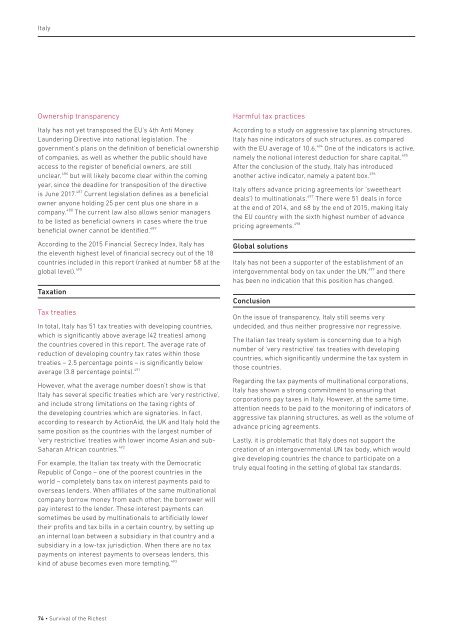Create successful ePaper yourself
Turn your PDF publications into a flip-book with our unique Google optimized e-Paper software.
Italy<br />
Ownership transparency<br />
Italy has not yet transposed <strong>the</strong> EU’s 4th Anti Money<br />
Laundering Directive into national legislation. The<br />
government’s plans on <strong>the</strong> definition <strong>of</strong> beneficial ownership<br />
<strong>of</strong> companies, as well as whe<strong>the</strong>r <strong>the</strong> public should have<br />
access to <strong>the</strong> register <strong>of</strong> beneficial owners, are still<br />
unclear, 486 but will likely become clear within <strong>the</strong> coming<br />
year, since <strong>the</strong> deadline for transposition <strong>of</strong> <strong>the</strong> directive<br />
is June 2017. 487 Current legislation defines as a beneficial<br />
owner anyone holding 25 per cent plus one share in a<br />
company. 488 The current law also allows senior managers<br />
to be listed as beneficial owners in cases where <strong>the</strong> true<br />
beneficial owner cannot be identified. 489<br />
According to <strong>the</strong> 2015 Financial Secrecy Index, Italy has<br />
<strong>the</strong> eleventh highest level <strong>of</strong> financial secrecy out <strong>of</strong> <strong>the</strong> 18<br />
countries included in this report (ranked at number 58 at <strong>the</strong><br />
global level). 490<br />
Taxation<br />
Tax treaties<br />
In total, Italy has 51 tax treaties with developing countries,<br />
which is significantly above average (42 treaties) among<br />
<strong>the</strong> countries covered in this report. The average rate <strong>of</strong><br />
reduction <strong>of</strong> developing country tax rates within those<br />
treaties – 2.5 percentage points – is significantly below<br />
average (3.8 percentage points). 491<br />
However, what <strong>the</strong> average number doesn’t show is that<br />
Italy has several specific treaties which are 'very restrictive',<br />
and include strong limitations on <strong>the</strong> taxing rights <strong>of</strong><br />
<strong>the</strong> developing countries which are signatories. In fact,<br />
according to research by ActionAid, <strong>the</strong> UK and Italy hold <strong>the</strong><br />
same position as <strong>the</strong> countries with <strong>the</strong> largest number <strong>of</strong><br />
'very restrictive' treaties with lower income Asian and sub-<br />
Saharan African countries. 492<br />
For example, <strong>the</strong> Italian tax treaty with <strong>the</strong> Democratic<br />
Republic <strong>of</strong> Congo – one <strong>of</strong> <strong>the</strong> poorest countries in <strong>the</strong><br />
world – completely bans tax on interest payments paid to<br />
overseas lenders. When affiliates <strong>of</strong> <strong>the</strong> same multinational<br />
company borrow money from each o<strong>the</strong>r, <strong>the</strong> borrower will<br />
pay interest to <strong>the</strong> lender. These interest payments can<br />
sometimes be used by multinationals to artificially lower<br />
<strong>the</strong>ir pr<strong>of</strong>its and tax bills in a certain country, by setting up<br />
an internal loan between a subsidiary in that country and a<br />
subsidiary in a low-tax jurisdiction. When <strong>the</strong>re are no tax<br />
payments on interest payments to overseas lenders, this<br />
kind <strong>of</strong> abuse becomes even more tempting. 493<br />
Harmful tax practices<br />
According to a study on aggressive tax planning structures,<br />
Italy has nine indicators <strong>of</strong> such structures, as compared<br />
with <strong>the</strong> EU average <strong>of</strong> 10.6. 494 One <strong>of</strong> <strong>the</strong> indicators is active,<br />
namely <strong>the</strong> notional interest deduction for share capital. 495<br />
After <strong>the</strong> conclusion <strong>of</strong> <strong>the</strong> study, Italy has introduced<br />
ano<strong>the</strong>r active indicator, namely a patent box. 496<br />
Italy <strong>of</strong>fers advance pricing agreements (or ‘swee<strong>the</strong>art<br />
deals’) to multinationals. 497 There were 51 deals in force<br />
at <strong>the</strong> end <strong>of</strong> 2014, and 68 by <strong>the</strong> end <strong>of</strong> 2015, making Italy<br />
<strong>the</strong> EU country with <strong>the</strong> sixth highest number <strong>of</strong> advance<br />
pricing agreements. 498<br />
Global solutions<br />
Italy has not been a supporter <strong>of</strong> <strong>the</strong> establishment <strong>of</strong> an<br />
intergovernmental body on tax under <strong>the</strong> UN, 499 and <strong>the</strong>re<br />
has been no indication that this position has changed.<br />
Conclusion<br />
On <strong>the</strong> issue <strong>of</strong> transparency, Italy still seems very<br />
undecided, and thus nei<strong>the</strong>r progressive nor regressive.<br />
The Italian tax treaty system is concerning due to a high<br />
number <strong>of</strong> 'very restrictive' tax treaties with developing<br />
countries, which significantly undermine <strong>the</strong> tax system in<br />
those countries.<br />
Regarding <strong>the</strong> tax payments <strong>of</strong> multinational corporations,<br />
Italy has shown a strong commitment to ensuring that<br />
corporations pay taxes in Italy. However, at <strong>the</strong> same time,<br />
attention needs to be paid to <strong>the</strong> monitoring <strong>of</strong> indicators <strong>of</strong><br />
aggressive tax planning structures, as well as <strong>the</strong> volume <strong>of</strong><br />
advance pricing agreements.<br />
Lastly, it is problematic that Italy does not support <strong>the</strong><br />
creation <strong>of</strong> an intergovernmental UN tax body, which would<br />
give developing countries <strong>the</strong> chance to participate on a<br />
truly equal footing in <strong>the</strong> setting <strong>of</strong> global tax standards.<br />
74 • <strong>Survival</strong> <strong>of</strong> <strong>the</strong> <strong>Richest</strong>


